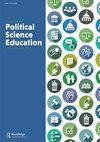充分利用嘉宾专家:分组讨论、访谈和学生讨论者
IF 0.6
Q3 POLITICAL SCIENCE
引用次数: 1
摘要
邀请嘉宾演讲是教师的一种常见做法,因为它可以为学生提供新的见解。然而,这种体验往往令人失望。这篇文章提到了嘉宾专家,这标志着传统方法的突破,在传统方法中,嘉宾演讲者主要以单向的方式传递信息,没有任何课堂外的参与。本文以三种方法为例,说明如何以不同的方式使用客座专家。首先,专家被邀请参加问答环节,但不包括讲座,学生被分配担任讨论者的角色。其次,学生们与专家进行访谈,然后在辩论作业中使用他们收集到的信息。第三,组织在线分组讨论室,以便从业者可以直接与学生一起解决关键问题。本文借鉴了主动学习、多种学习类型、反思性学习和脚手架的概念写作,认为可以重新设计客座专家的使用,以获得更好的影响。通过与不同形式的专家交流,学生可以提高他们的研究和沟通技巧,并获得进一步学习和参与公民活动的信心和动力。这三种教学实践的优势在于,它们可以选择性地添加到课堂中,以架起面对面和在线学习的桥梁。本文章由计算机程序翻译,如有差异,请以英文原文为准。
Making the Most of Guest Experts: Breakout Rooms, Interviews, and Student Discussants
Abstract Hosting guest speakers is a common practice among instructors because it can yield new insights for students. However, the experience is often disappointing. This article refers to guest experts to signal a break from the conventional approach, in which guest speakers deliver information primarily in a one-directional manner without any engagement outside the classroom. Three methods are presented as examples of how guest experts can be used differently. First, experts are invited to question-and-answer sessions without a lecture component, and students are assigned discussant roles. Second, students conduct interviews with experts and then use the information that they gather in a debate assignment. Third, online breakout rooms are organized so that practitioners can work through a key issue directly with students. The article draws on conceptual writing on active learning, multiple learning genres, reflective learning, and scaffolding to argue that the use of guest experts can be redesigned for better impact. By encountering experts in different formats, students improve their research and communication skills and gain confidence and motivation for further study and civic engagement. The advantage of these three teaching practices is that they can be selectively added to classrooms that bridge in-person and online learning.
求助全文
通过发布文献求助,成功后即可免费获取论文全文。
去求助
来源期刊

Journal of Political Science Education
POLITICAL SCIENCE-
CiteScore
1.80
自引率
36.40%
发文量
69
期刊介绍:
The Journal of Political Science Education is an intellectually rigorous, path-breaking, agenda-setting journal that publishes the highest quality scholarship on teaching and pedagogical issues in political science. The journal aims to represent the full range of questions, issues and approaches regarding political science education, including teaching-related issues, methods and techniques, learning/teaching activities and devices, educational assessment in political science, graduate education, and curriculum development. In particular, the journal''s Editors welcome studies that reflect the scholarship of teaching and learning, or works that would be informative and/or of practical use to the readers of the Journal of Political Science Education , and address topics in an empirical way, making use of the techniques that political scientists use in their own substantive research.
 求助内容:
求助内容: 应助结果提醒方式:
应助结果提醒方式:


